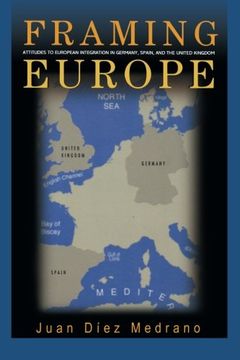Share
Framing Europe: Attitudes to European Integration in Germany, Spain, and the United Kingdom (Princeton Studies in Cultural Sociology) (in English)
Juan Diez Medrano (Author)
·
Princeton University Press
· Paperback
Framing Europe: Attitudes to European Integration in Germany, Spain, and the United Kingdom (Princeton Studies in Cultural Sociology) (in English) - Juan Diez Medrano
$ 45.60
$ 57.00
You save: $ 11.40
Choose the list to add your product or create one New List
✓ Product added successfully to the Wishlist.
Go to My WishlistsIt will be shipped from our warehouse between
Monday, June 10 and
Tuesday, June 11.
You will receive it anywhere in United States between 1 and 3 business days after shipment.
Synopsis "Framing Europe: Attitudes to European Integration in Germany, Spain, and the United Kingdom (Princeton Studies in Cultural Sociology) (in English)"
This book provides a major empirical analysis of differing attitudes to European integration in three of Europe's most important countries: Germany, Spain, and the United Kingdom. From its beginnings, the European Union has resounded with debate over whether to move toward a federal or intergovernmental system. However, Juan Diez Medrano argues that empirical analyses of support for integration--by specialists in international relations, comparative politics, and survey research--have failed to explain why some countries lean toward federalism whereas others lean toward intergovernmentalism. By applying frame analysis to a unique set of primary sources (in-depth interviews, newspaper articles, novels, history texts, political speeches, and survey data), Diez Medrano demonstrates the role of major historical events in transforming national cultures and thus creating new opportunities for political transformation. Clearly written and rigorously argued, Framing Europe explains differences in support for European integration between the three countries studied in light of the degree to which each realized its particular "supranational project" outside Western Europe. Only the United Kingdom succeeded in consolidating an empire and retaining it after World War II, while Germany and Spain each abandoned their corresponding aspirations. These differences meant that these countries' populations developed different degrees of identification as Europeans and, partly in consequence, different degrees of support for the building of a federal Europe.

